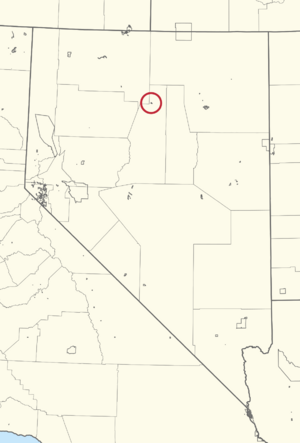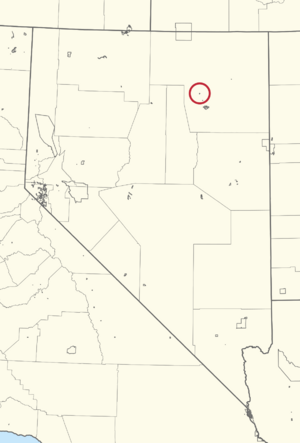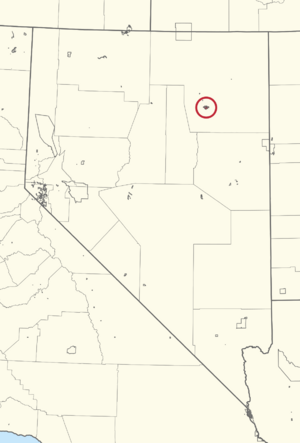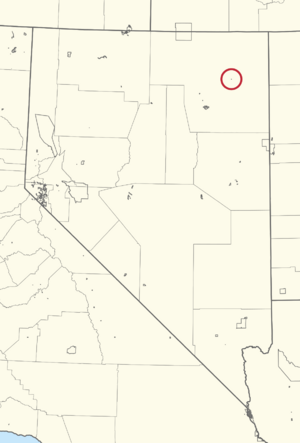Te-Moak Tribe of Western Shoshone Indians of Nevada facts for kids
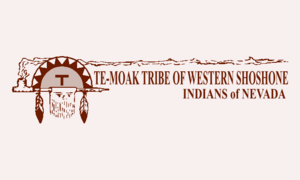
Tribal Flag
|
|
| Total population | |
|---|---|
| 2,096 | |
| Regions with significant populations | |
| Languages | |
| English, Shoshoni | |
| Religion | |
| traditional tribal religion | |
| Related ethnic groups | |
| other Western Shoshone tribes |
The Te-Moak Tribe of Western Shoshone Indians of Nevada is a Native American tribe. They are officially recognized by the United States government. This tribe of Western Shoshone people lives in northeastern Nevada.
Contents
History of the Te-Moak Tribe
The Te-Moak Tribe was officially organized in 1934. This happened under a law called the Indian Reorganization Act. This law helped Native American tribes form their own governments.
The Western Shoshone people chose a traditional council. This council was led by Chief Muchach Temoak and his family. However, the United States government did not recognize this council. Instead, the U.S. government created its own group called the Te-Moaks Bands Council.
Many traditional tribal members felt this new council did not represent them. In 1974, they formed a group to protect their rights. This group is now known as the Sacred Lands Association.
These traditionalists argued that the Te-Moak Bands Council did not speak for them. They also said the tribe never gave up their claim to their traditional lands. They brought their case to the Indian Claims Commission (ICC).
In 1979, the ICC decided against the tribe. They ruled that the Western Shoshone had lost their land. This was said to have happened because of the Treaty of Ruby Valley in 1863.
Later, in 1980, courts ruled that the land was not given up in 1863. Instead, they said it was lost on December 6, 1979. The tribe appealed this decision.
In 1985, the U.S. Supreme Court ruled that $26 million was paid to the tribe. This payment was for about 24 million acres (97,000 km²) of land. The Te-Moak Tribe continues to work to get their traditional lands back today.
The tribe's official rules were approved in 1938. Their current rules were updated in 1982.
The Te-Moak Tribe Today
The Te-Moak Tribe Council has its main office in Elko, Nevada. The tribe is made up of four main groups, called bands. Their rules allow new reservations and communities to join the tribe.
Battle Mountain Band
This band manages the Battle Mountain reservation. It is located in Battle Mountain, Nevada. Their traditional name is Tonomudza or Tonammutsa (Donammuzi).
Their land is made up of separate areas. These areas total about 683.3 acres (2.765 km²). About 165 members live on the reservation. The total number of people in this band is 516.
Elko Band
The Elko Indian Colony was started in 1918. It is located in Elko, Nevada. This band manages about 192.8 acres (0.780 km²) of federal trust lands.
There are 1,143 people enrolled in the Elko Band. About 6% of the band members have finished high school. Their average yearly income per person is about $7,000.
South Fork Band
The South Fork and Odgers Ranch Indian Reservation was created in 1941. It is located near Lee, Nevada. This band manages about 19,049 acres (77.10 km²) of land.
Fifty-nine members live on the reservation. The total number of people in this band is 176.
Wells Band
The Wells Indian Colony was started in 1980. It is located in Wells, Nevada. This colony is about 80 acres (320,000 m²) in size.
Traditionally, they are known as the Kuiyudika band of Western Shoshone. This name comes from a desert plant used for food. Within this group were smaller groups. These included the Doyogadzu Newenee (end-of-the-mountain people) and the Waiha-Muta Newenee (fire-burning-on ridge people). Clover Valley was a meeting place for these small Newe bands.
Thirty-nine members live on the reservation. The total number of people in this band is 177.
Notable Te-Moak Shoshone
- Ned Blackhawk, a Te-Moak historian and professor at Yale University
 | Jewel Prestage |
 | Ella Baker |
 | Fannie Lou Hamer |


